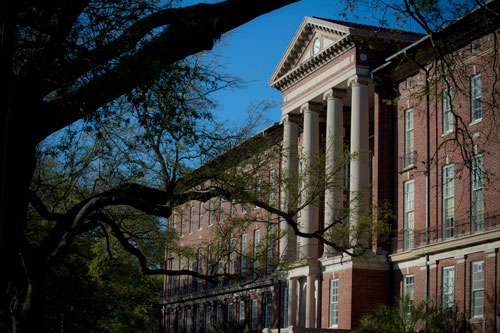Getting the call to tutor a famous actress in a blockbuster film is not high on the list of typical things a Tulane faculty member may be asked to do. But that is exactly what happened to German & Slavic Studies visiting lecturer Dietmar Felber.
When the Germanic and Slavic Studies departmental chair Elio Brancaforte was contacted by Quentin Tarantino's assistant seeking a German language tutor, Prof. Brancaforte almost deleted the e-mail, thinking it must be spam. However, upon confirming the authenticity of the request, Brancaforte recruited Felber to coach actress Kerry Washington. Washington currently stars in the ABC TV series Scandal.
In Tarantino's latest film, Django Unchained, Washington plays a domestic slave named Broomhilda, who is fluent in German as her former owner was German. In the film, she is held at a plantation by the villain Calvin Candie (played by Leonardo di Caprio). Django, her slave husband (played by Jamie Fox), and Dr. Schultz, a German bounty hunter (played by Christoph Waltz), develop an elaborate plan to free her. When Broomhilda first meets Dr. Schultz, he addresses her in German so he can secretly tell her that he and Django have come to free her.
Felber coached Washington in how to say her German lines. In the exchange, Quentin Tarantino deliberately wanted Broomhilda to make a mistake in addressing Dr. Schultz, which audience-members familiar with German will likely catch.
"The German dialogue scene is a crucial scene in the film," said Felber, adding, "German-speaking slaves are historically plausible."
New Orleans, Richmond and Charleston had small but visible German immigrant communities, according to research by Andrea Mehrländer, Ph.D., and Ellen Merrill, Ph.D. (Tulane), so the German language has had a historical presence in the South as well as the North. For instance, in Friedrich Gerstäcker's ethnographically informed novel Nach Amerika! (1855), a German immigrant family arrives at the port of New Orleans and encounters a quadroon girl who gives them flowers—and speaks German to them. Her owner, she explains, is a local German named Messerschmidt.
Felber also helped Washington learn the lyrics to a German folk song named "Abendlied," which is based on one of the most widely known poems in the German language, written by the 18th century poet Matthias Claudius. "It's an extremely beautiful and poetic song, which manages to be at once a sly critique of the German Enlightenment and a soothing night song or lullaby for children," said Felber. "There are tons of choral, classical, pop, and rock versions of it on Youtube."
In coaching Ms. Washington, Felber mapped all the difficult sounds in corresponding colors on a printout of the song lyric and coached Washington on how to pronounce them by employing contrastive pairs, and other methods, until she was ready to perform the entire song from memory.
"The teaching procedure was similar to language instruction in the classroom, but much more systematic, concentrated, and intense because there was no room for error," said Felber. For instance, he explained, the absence of merely the aspirant (h) in the middle of the word "Abendhauch" will completely change the meaning from "evening breath" (i.e., evening air) to "evening also," which would make the singer seem incompetent.
As an accomplished professional actress, Kerry Washington proved entirely up to the task. She wanted to know everything about the meaning of the song and, when she sang it, did not want to be praised but wanted to know precisely what she was doing wrong, and why, said Felber.
When she practiced the song, she sometimes sang it to her little dog, which would promptly go to sleep. Once, after a coaching session, she performed the song for the studio staff, all of whom were left speechless. "Kerry loves language, and she's incredibly good at imitating sounds and speaking in foreign tongues, so her progress was fantastic," Felber noted.
Unfortunately, the song was edited out of the film; however, Washington's and Felber's musical collaboration did not go to waste. A couple of weeks after Washington finished shooting her German-language scene, she came to a Newcomb Hall classroom, with her parents in tow, sang the song for the students in the German program, and answered their questions.
One of the students in the audience, junior Reese Osta, a German major from Albuquerque, NM, thought it was "a fantastic experience for everyone who attended."
"It was really amazing to have a renowned actress take time out of her schedule to very humbly entertain us and our curiosities regarding the film and co-stars ... I was stunned by how it seemed Ms. Washington was more interested in us students and our studies than talking about her upcoming film."
Osta, who in addition to majoring in German Studies is getting a secondary teacher certification at Tulane, added: "I think it is really impressive that one of the department's own had this opportunity to work with a major director and actress—it is a showcase of what one can do with a career in foreign languages."
For the German and Slavic studies department, it was a productive and exciting collaboration. Since Django Unchained is a film, image is paramount. But language is also crucial. Tarantino is a master of dialogue in the American vernacular, but his recent films also draw on foreign languages, enmesh them in the play of antagonistic forces, and often make them secret codes that help undermine the villains and the oppressive systems they represent.
"Since our instructors teach two such foreign languages, German and Russian," Department Chair Elio Brancaforte explained, "we were intrigued by the opportunity to contribute to Tarantino's latest film, particularly since the knowledge of foreign languages plays an important role in the movie. It also is a reminder of the multilingual character of 19th-century New Orleans and the significant role that German-Americans played in the development of the city and in the areas all along the Mississippi."
